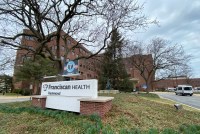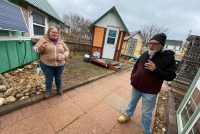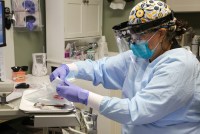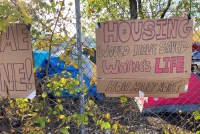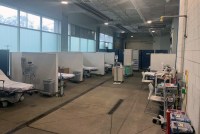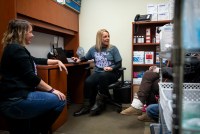States Fight Student Mental Health Crisis With Days Off
In early 2022, Illinois joined a growing number of states where lawmakers and school leaders are trying to combat the ongoing student mental health crisis by granting days off for mental health needs.
Downsized City Sees Its Health Care Downsized as Hospital Awaits Demolition
A 124-year-old hospital in a midsize Rust Belt city in Indiana will soon be torn down, despite protests from residents and city officials decrying the loss of local health services. The Catholic hospital system said it is downsizing the 226-bed hospital because of a lack of demand for inpatient care, as the organization has been building new hospitals in wealthier suburbs.
Casas pequeñas ofrecen más que un techo para las personas sin hogar
Hasta Arnold Schwarzenegger donó dinero para 25 casas pequeñas en Los Angeles. Una solución para las personas sin techo.
How the Tiny-Home Movement Is Providing More Than Just a Roof to Homeless People
Cities and nonprofits across the country are building communities of tiny homes to safely house people amid covid and cold winters. Proponents say tiny homes give people dignity and privacy, but some advocates for homeless people say they don’t go far enough.
Centro comunitario hispano lidera la vacunación infantil contra covid en Chicago
Esperanza Health Centers ha liderado la vacunación contra covid en la población infantil y adolescente de Chicago, ayudando a grupos que han sido más vulnerables al coronavirus.
How One Health Center Is Leading Chicago on Kid Covid Shots
A health center with clinics on Chicago’s southwest side that serves mostly Hispanic patients has provided the most covid shots to kids in the city by being accessible, (literally) speaking the language of the community and setting up pop-up clinics at schools and parks. It provides a few lessons as the nation gears up to vaccinate 5- to 11-year-olds.
Hygienists Brace for Pitched Battles With Dentists in Fights Over Practice Laws
In a battle reflecting turf wars around the country, Illinois dentists defeated legislation that would have allowed hygienists to practice in nursing homes and prisons where dental care can be scarce.
Indiana School Goes Extra Mile to Help Vulnerable Kids Weather Pandemic
Many students at Sarah Scott Middle School in Terre Haute, Indiana, deal with poverty, dysfunction and stress. Since the pandemic hit, teachers and administrators have struggled to give kids and families the support they need.
Illinois, primer estado en ofrecer cobertura médica a adultos mayores indocumentados
Se espera que la normativa cubra inicialmente de 4,200 a 4,600 inmigrantes mayores. Defensores esperan que Illinois inspire a otros estados.
Illinois Is First in the Nation to Extend Health Coverage to Undocumented Seniors
As the pandemic hits Latino communities especially hard, Illinois is expanding public health insurance to all low-income noncitizen seniors. Advocates hope other states follow its lead.
Homeless Shelters Grapple With COVID Safety as Cold Creeps In
During the pandemic, shelters are having to change the way they do things to prevent the virus from spreading among the vulnerable homeless population. Now, as winter weather moves in, there’s less room at the shelters for those in need — threatening to leave many, literally, out in the cold.
New Moms Behind Bars Get Help From Someone Who’s Been There
Nina Porter of Indiana spent most of her adulthood behind bars, even raising an infant daughter in prison. Now out of prison, she’s drawing on her struggles to create a program that helps other moms get by in a sometimes unwelcoming post-prison world.
Coronavirus Crisis Disrupts Treatment For Another Epidemic: Addiction
The coronavirus has forced drug rehabilitation centers to scale back operations or temporarily close, leaving people who have another potentially deadly disease — addiction — with fewer opportunities for help.
Despite Pandemic, Trauma Centers See No End To ‘The Visible Virus Of Violence’
A steady stream of gunshot victims continues to flow into a trauma center on Chicago’s South Side and many other metropolitan trauma centers. This puts a strain on hospitals already busy fighting COVID-19.
Conservative Indiana Adopted Needle Exchanges But Still Faces Local Resistance
Indiana was ground zero for shifting ideas about needle exchanges after a small town had an HIV outbreak in 2015 brought on by needle-sharing. But even as other parts of the country start to embrace needle exchanges amid the ongoing opioid epidemic, the sites remain controversial in Indiana. Only nine of the state’s 92 counties have them, after a series of closures and reopenings.




